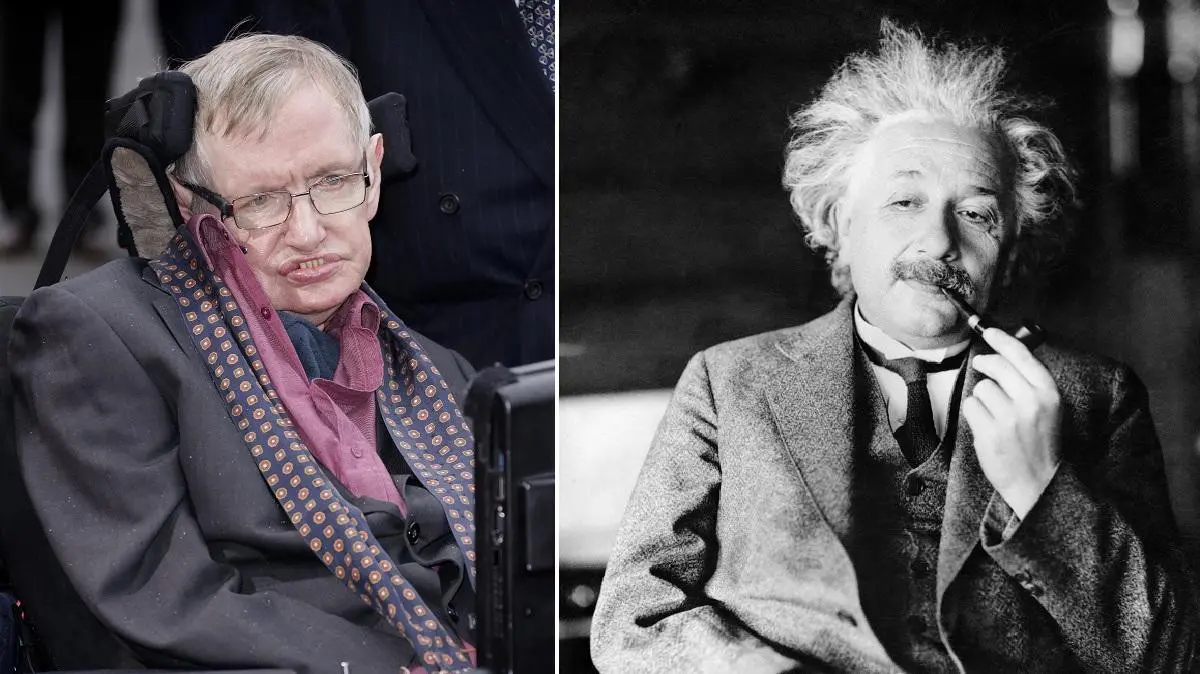Hawking and Einstein Discussing God
Hawking dan Einstein berdiskusi tentang Tuhan. Fisikawan terkemuka sering kali meremehkan peran Tuhan dalam penciptaan alam semesta, karena konsep pencipta ilahi tidak dapat dipahami dalam teori dan pengamatan. Namun apakah hal ini membuktikan tidak adanya Pencipta?
Skeptisisme Big Bang
Salah satu teori yang menyulut skeptisisme terhadap konsep ketuhanan adalah teori Big Bang. Konsep ini menunjukkan bahwa alam semesta dimulai sebagai sebuah titik yang sangat padat, lebih kecil dari sebuah atom, dengan perilaku gravitasi yang tidak dapat kita pahami.
Titik ini kemudian “meledak”, dengan cepat meluas ke seluruh materi, energi, dan ruang kosong yang kini membentuk alam semesta. Namun, ketika para ilmuwan mencoba menyelidiki asal mula alam semesta yang sebenarnya, mereka menemui jalan buntu. Permasalahan muncul karena, dalam keadaan kepadatan ekstrim ketika alam semesta masih dalam masa pertumbuhan, konsep waktu dan ruang kehilangan maknanya. Tidak ada awal, dan tidak ada akhir.
Wawasan Stephen Hawking
Dalam buku terakhirnya, “Brief Answers to Big Questions” (2018), Stephen Hawking mengeksplorasi ide-ide ini. Dia mengibaratkan keadaan ini seperti lubang hitam, sebuah bintang yang runtuh begitu padat sehingga cahaya pun tidak bisa lepas dari tarikan gravitasinya.
Sama seperti alam semesta sebelum Big Bang, lubang hitam menjadi singularitas, suatu kondisi di mana hukum fisika tidak berlaku, dan tidak ada konsep ruang dan waktu. Sederhananya, di kedalaman lubang hitam, waktu tidak ada lagi.
Karena alam semesta juga dimulai sebagai sebuah singularitas, Hawking berpendapat bahwa waktu itu sendiri tidak mungkin ada sebelum Big Bang. Oleh karena itu, jawabannya terhadap pertanyaan tentang apa yang terjadi sebelum Big Bang adalah, “tidak ada waktu sebelum Big Bang.”
“Kami akhirnya menemukan sesuatu yang tidak ada penyebabnya karena tidak ada waktu untuk mencari penyebabnya,” tulis Hawking. “Bagi saya, ini berarti tidak ada kemungkinan adanya Pencipta karena tidak ada waktu bagi Pencipta untuk ada.”
Penciptaan Alam Semesta Secara Spontan
Pria yang kehidupannya digambarkan dalam “The Theory of Everything” (2014) ini menyatakan bahwa “alam semesta secara spontan menciptakan dirinya sendiri dari ketiadaan, sesuai dengan hukum sains.”
“Jika Anda menerima, seperti saya, bahwa hukum alam itu tetap, maka tidak perlu waktu lama untuk bertanya: Apa peran Tuhan?” dia melanjutkan. Stephen Hawking meninggal pada tahun 2018.
Perspektif Einstein
Albert Einstein, tokoh ikonik lainnya di dunia fisika, juga mempunyai pemikiran tentang konsep pencipta ilahi. Meskipun dia tidak sepenuhnya menolak gagasan tersebut, dia memiliki pandangan yang lebih abstrak dan impersonal tentang Tuhan. Einstein percaya pada Tuhan Spinoza, dewa yang mewakili keteraturan dan keharmonisan alam semesta, daripada Tuhan yang bersifat intervensionis dan pribadi.
Einstein terkenal mengatakan, “Tuhan tidak bermain dadu dengan alam semesta,” yang mengungkapkan keyakinannya pada keteraturan mendasar kosmos. Ia memandang hukum alam sebagai cerminan tatanan ilahi ini, sehingga membuatnya percaya pada suatu bentuk panteisme yang mengidentifikasi alam semesta itu sendiri sebagai sesuatu yang ilahi.
Sifat Alam Semesta
Dalam dunia fisika, hakikat alam semesta dan asal usulnya terus menjadi bahan kajian dan perdebatan yang intens. Meskipun para fisikawan ikonik ini memberikan perspektif mereka, upaya untuk memahami sifat sejati alam semesta dan potensi asal usul ilahinya tetap merupakan upaya yang berkelanjutan dan memiliki banyak aspek.
Kesimpulan
Fisikawan terkemuka seperti Stephen Hawking dan Albert Einstein telah menawarkan wawasan mereka tentang konsep pencipta ilahi dalam konteks asal usul alam semesta. Eksplorasi Hawking terhadap singularitas dan tidak adanya waktu sebelum Big Bang membawanya pada kesimpulan bahwa keberadaan Pencipta sangat kecil kemungkinannya. Einstein, sebaliknya, menganut pandangan yang lebih abstrak tentang Tuhan sebagai representasi keteraturan dan harmoni alam semesta.
Hubungan antara sains dan spiritualitas adalah subjek yang kompleks dan abadi, dan perspektif ini hanya berfungsi sebagai gambaran sekilas tentang dialog yang sedang berlangsung tentang hakikat alam semesta dan keberadaan Sang Pencipta. Meskipun sains berupaya mengungkap mekanisme dan asal usul alam semesta, pertanyaan tentang iman dan spiritualitas tetap bersifat sangat pribadi dan beragam.
